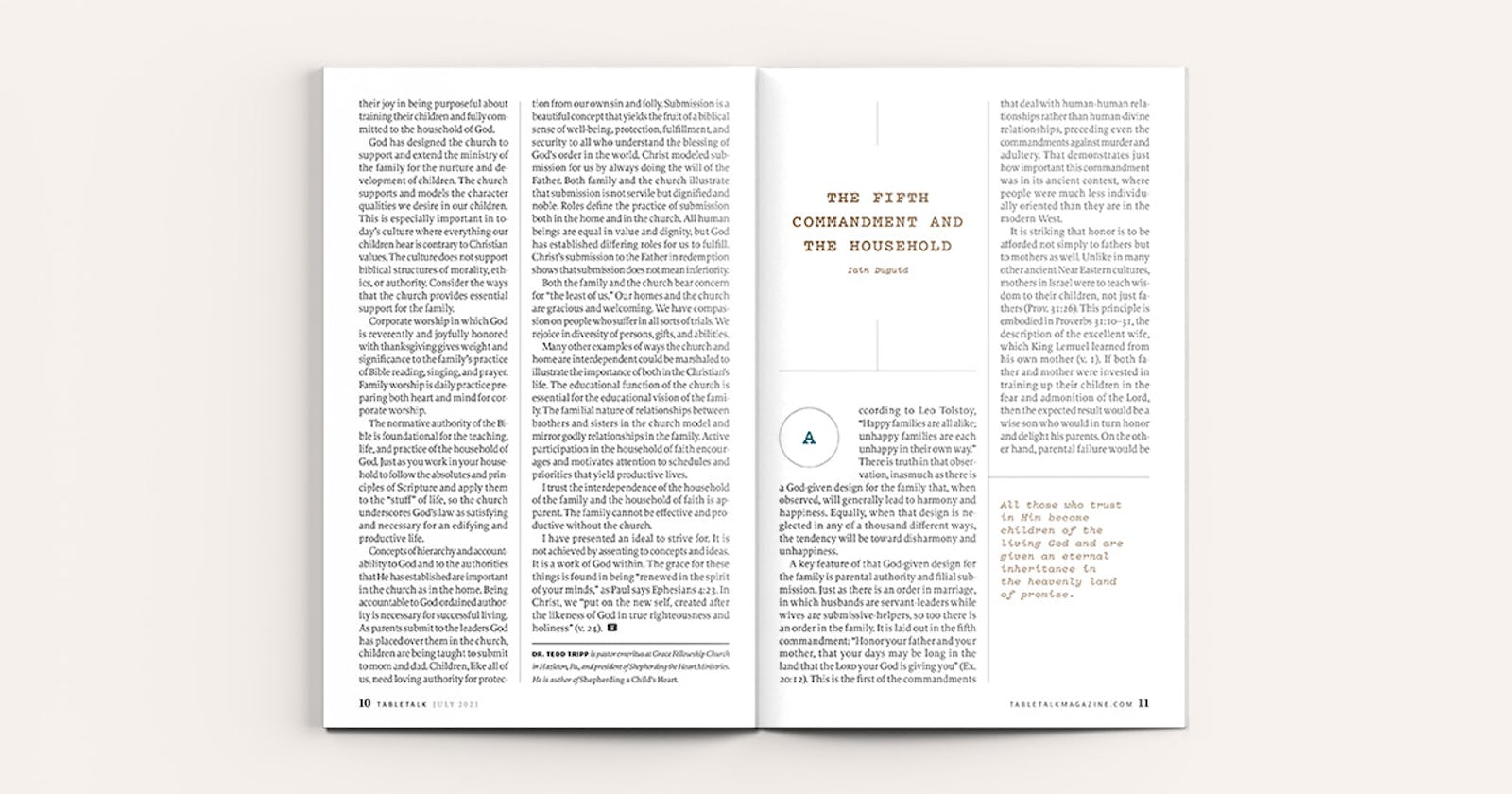
Request your free, three-month trial to Tabletalk magazine. You’ll receive the print issue monthly and gain immediate digital access to decades of archives. This trial is risk-free. No credit card required.
Try Tabletalk NowAlready receive Tabletalk magazine every month?
Verify your email address to gain unlimited access.
According to Leo Tolstoy, “Happy families are all alike; unhappy families are each unhappy in their own way.” There is truth in that observation, inasmuch as there is a God-given design for the family that, when observed, will generally lead to harmony and happiness. Equally, when that design is neglected in any of a thousand different ways, the tendency will be toward disharmony and unhappiness.
A key feature of that God-given design for the family is parental authority and filial submission. Just as there is an order in marriage, in which husbands are servant-leaders while wives are submissive-helpers, so too there is an order in the family. It is laid out in the fifth commandment: “Honor your father and your mother, that your days may be long in the land that the LORD your God is giving you” (Ex. 20:12). This is the first of the commandments that deal with human-human relationships rather than human-divine relationships, preceding even the commandments against murder and adultery. That demonstrates just how important this commandment was in its ancient context, where people were much less individually oriented than they are in the modern West.
It is striking that honor is to be afforded not simply to fathers but to mothers as well. Unlike in many other ancient Near Eastern cultures, mothers in Israel were to teach wisdom to their children, not just fathers (Prov. 31:26). This principle is embodied in Proverbs 31:10–31, the description of the excellent wife, which King Lemuel learned from his own mother (v. 1). If both father and mother were invested in training up their children in the fear and admonition of the Lord, then the expected result would be a wise son who would in turn honor and delight his parents. On the other hand, parental failure would be likely to lead to a foolish son, who would be a disgrace to both (10:1).
The ultimate expression of a breakdown in the family authority structure would be for a child to curse his father or his mother, a crime that was accorded the death penalty under the Mosaic covenant (Ex. 21:17; Lev. 20:9). This harsh punishment showed the seriousness with which the Ten Commandments were to be observed—sinners who deliberately flouted God’s law were to be cut off from the covenant community (Prov. 20:20), a fate that visibly represented the permanent cutting off from the gracious presence of God that all sin deserves.
In the New Testament, in addition to reiterating the fifth commandment, Paul highlights the responsibility of parents not to exasperate their children (Eph. 6:2–4). He treats this as part of a sequence of instructions about authority relationships: wives-husbands, children-parents, and slaves-masters (Eph. 5:22–6:9). Building on this connection, the Westminster Larger Catechism expounds the fifth commandment in its application to all relationships involving “inferiors” and “superiors”—a concept that may sound foreign in our egalitarian age but upon which Paul rests his argument.

One biblical example of an egregious breach of the fifth commandment is the story Jesus told about the Prodigal Son (Luke 15:11–32): in demanding his inheritance immediately, the son was effectively wishing that his father were dead. He may not have cursed his father and mother out loud, but his actions revealed his heart’s desire for them to die. After he left home and squandered his inheritance, there should have been no place for him to return to his household—indeed, according to the law of Moses, he should have been executed. Yet the father welcomed him home in spite of his transgression. Restoring the wholeness of the household was more important to the father than seeing strict punishment executed.
The grace exhibited in this story would be impossible without the faithfulness of the Son who told it. Unlike the prodigal, Jesus honored and obeyed His Father’s wish for Him to go into a far country, not to waste His money but to offer Himself as a living sacrifice. His sacrificial death on the cross atones for all the times you and I have failed to honor our parents and other lawful superiors; meanwhile, His perfect obedience to the Father is credited to us as if it were our own honoring of those over us. As a result of Christ’s obedience, God’s household has now been made whole, as all those who trust in Him become children of the living God and are given an eternal inheritance in the heavenly land of promise (John 1:12; Eph. 1:3).
